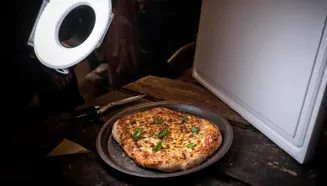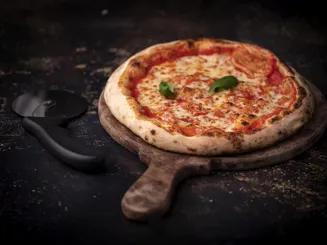Pizza can be considered as one of photography’s trickiest customers. We’ve teamed up with chef, photographer and food styling expert Tom Cockerill to share his top tips to help you up your pizza photography game. Combining Tom’s tips and some of your own creativity - you can get some great images using just your phone.
Tip: Tom’s advice will work just as well for capturing videos too!

1. Let’s start with lighting
The first, and perhaps most important, consideration when photographing or filming pizza is to consider lighting. Using natural light is the best way to show realistic colours and create a natural feel to your images. A perfectly composed and styled shot can be ruined by shooting under warm fluorescent lighting, which gives everything a yellowish and unnatural hue.
Shooting close to a window or glass doorway is ideal. The time of day makes a difference too – take your photos an hour or two after sunrise or before sunset when the sun is lower in the sky to get lovely subtle side lighting.
Watch out for bright sunny days as direct sunlight can be harsh. A white curtain or transparent fabric pinned against the window will help diffuse the light. Make sure to turn off any nearby internal lights too.
Tip: To even out the light source you can use a sheet of white card, or even the top of your cool box on the opposite side of your composition to ‘bounce’ light back into your photo.

2. Consider your composition
Aside from your perfect pizza (more on achieving that later), consider what else you want to include in your photograph. Including colourful fresh ingredients, for example herbs, tomatoes or garlic (always photogenic!) can add vibrancy to your photo and allude to the freshness and quality of your ingredients. Think about additional props such as an olive oil bottle, a pizza wheel or drinks that you may want to upsell – but stay subtle and considered, allowing the pizza to remain centre stage as the hero of your photo.
3. Back it up
The background is the supporting artist to your photo and could be anything from a restaurant table to a kitchen work surface – so long as the context feels relevant to you and your style of business. You could also consider investing in a professional photography backdrop. The many different textures available can create a subtle mood and feel for your photo, they can give you the flexibility to assemble a colour palette using the backdrop, coloured linens and plates that align with your own brand colours.








